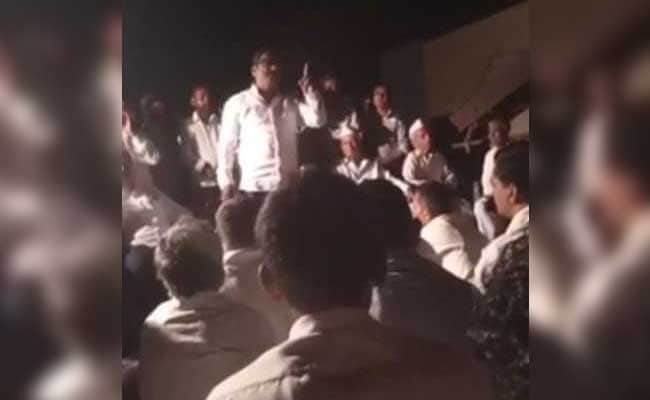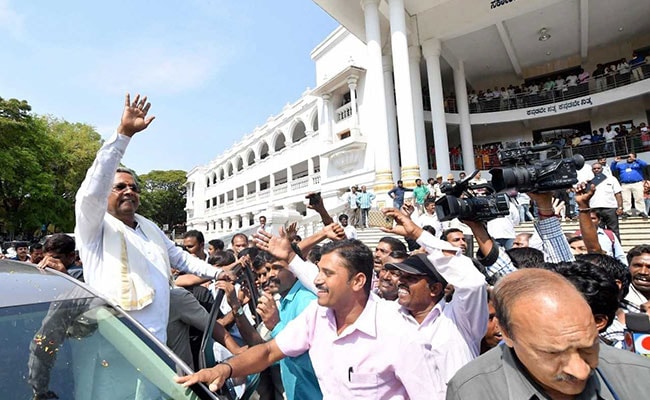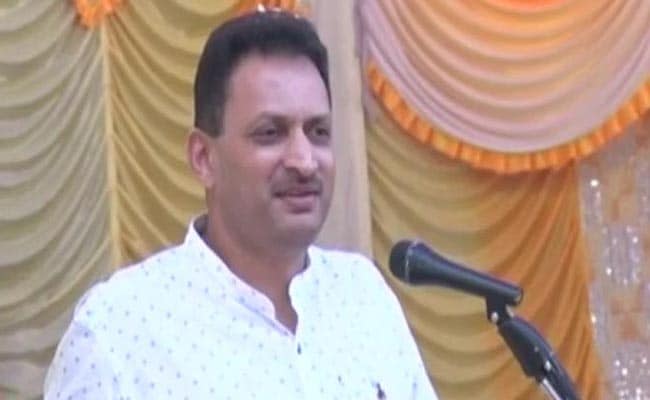
Karnataka Elections: Yogi Adityanath entered Karnataka with a series of tours that began in December.
Quick Take
Summary is AI generated, newsroom reviewed.
Hindu-Muslim rhetoric used by BJP leaders in coastal Karnataka
Chief Minister says -Ram is part of my name-, offers Hindu credentials
BJP blames him of failing to protect Hindu activists, says 24 were killed
To the crowd of supporters, the BJP leader said, "Whoever wants the Babri Masjid should vote for the Congress; those who want a Ram Mandir should vote for the BJP".
The proclaimer was Sanjay Patil, a lawmaker from the BJP, who was addressing his constituency in North Karnataka. "I want people to choose whether they will celebrate Shivaji Maharaj Jayanti or Tipu Sultan Jayanti," he told NDTV, using a riff introduced months earlier in the campaign for the southern state.

A video of BJP lawmaker Sanjay Patil provoked anger ahead of Karnataka assembly polls.
It was there that the 45-year-old saffron-robed Yogi publicly asked the people to "choose between Hanuman Jayanti and Tipu Sultan Jayanti", denoting the Congress as a pro-Muslim party. Two years ago, the Congress government in Karnataka decided to commemorate the birth anniversary of Tipu Sultan, provoking protests from the BJP. Both sides have been furiously cherry-picking historical facts to create competing narratives of Tipu, the 18th-century religious bigot who forced the conversion of Hindus, versus Tipu, the country's first freedom fighter who died while fighting the British to prevent the invasion of Mysuru.

Karnataka elections: The Siddaramaiah-led Congress government is facing a stiff battle from the BJP.
Manjunath is angry that despite the high number of farmer suicides in the state - over 600 between April and November last year - BJP leaders have not targeted the government of Chief Minister Siddaramaiah over rural distress. Instead, it is the alleged killing over the last four years of 24 activists linked to the Sangh Parivar that has driven the BJP's strategy in coastal Karnataka, a decades-old frontier of Hindu-Muslim rivalry.
The coastal belt consists of: Dakshina or South Kannada where Muslims form 24 percent of the population, higher than the state average; the Udupi district ; and Uttara or North Kannada. The BJP's ideological mentor, the Rashtriya Swayamsewak Sangh or RSS, has been a considerable force along the coast. Attempts to challenge that have been made by the Popular Front of India (PFI), a radical Islamist organisation founded in Kerala in 2006.
The BJP claims that since 2014, two dozen activists have been murdered by members of the PFI in coastal Karnataka . Police investigations have officially pointed to the involvement of PFI members in 10 of the 24 cases -the rest of the men were not victims of communal violence but family quarrels and land and business disputes, according to police documents. "One of the alleged victims was found to be alive and even received an apology from BJP lawmaker Shobha Karandlaje who had first made the list public," an Udupi-based journalist told NDTV.
But at a public meeting in February in Bengaluru, Prime Minister Narendra Modi said even his government was trying to facilitate "ease of doing business", there was "ease of doing murder" in Karnataka.
"Coastal Karnataka has never been this divided," charges Suresh Bhat Bakrabail, an activist who is a member of the Karnataka Forum for Communal Harmony.
The divide between the two communities, activists say, has sharpened after the last state election in which the BJP, wrecked by infighting, won just two of the 19 seats from the three districts of coastal Karnataka. That's when the RSS mobilized its formidable force of grassroots workers and delivered immediate results - barely a year later, the BJP won all three parliamentary seats in these areas.
"We will once again sweep coastal Karnataka," Dr Bharath Shetty, a BJP candidate from Mangaluru, told NDTV. "People here are angry with the Congress government for deliberately taking no action against the killers of Hindu activists for fear of losing the minority vote." He claims that there is no other election issue here except for the "murderous attacks on the protectors of the Hindu faith by members of the PFI." He is contradicted by U Rajesh Naik, another BJP candidate, who says it's wrong to write off the importance of development - and the lack of it on the Congress' watch. "At the end of the day, all people want is a better life," he says.

"At the end of the day, all people want is a better life," says BJP candidate U Rajesh Naik.
That was at the start of the year. After March 14, when the Yogi's homestead of Gorakhpur voted against the BJP in a shock defeat for the party, the Uttar Pradesh Chief Minister has not returned to Karnataka.
Filling in for him are a host of home-grown Hindutva ambassadors, with union minister Anant Kumar Hegde leading the pack. Last year, he described secularists as "people without parentage who didn't know their bloodline". Earlier this month. Mr Hedge - who, according to some in the party, has the potential to be groomed as its next Chief Minister - alleged he was the target of a failed assassination after an escort car in his convoy as hit by a truck driven by a Muslim. The police said it was an accident; it turned out that the truck was owned by a relative of a BJP leader.

Union minister Anant Kumar Hegde has faced several controversies, including being accused of communal hate speech.
Shadow groups who share the ideology of the Sangh Parivar have also become active. A provocative pamphlet in circulation in Mangaluru exhorts all Hindus to defeat the Congress "which is appeasing the PFI, its political wing and the followers of Tipu Sultan, and save Hinduism."

A pamphlet in circulation in Mangaluru exhorts all Hindus to defeat the Congress.
Coastal Karnataka is waiting for Prime Minister Narendra Modi's rejoinder when he visits the region next week where no other issue has been given any space.
Track Latest News Live on NDTV.com and get news updates from India and around the world

